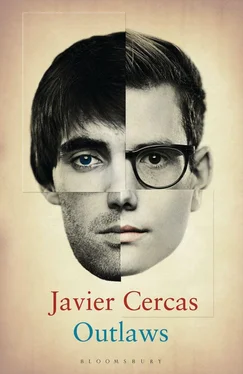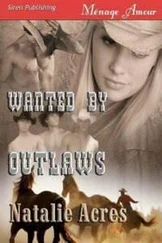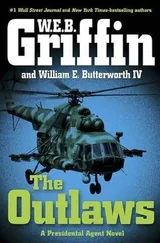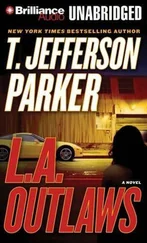‘That happened on a Saturday. Sunday morning we drove back to Gerona, and that day and the following ones I was anxious. Classes were just about to start again and, as I told you, I’d promised my father that I would go back to school and not go back to the red-light district. I kept my word, at least as far as the district was concerned (and intended to keep it about school as soon as I could). No, the anxiety didn’t come from that side; it didn’t come from my family either: suddenly, in just a few days, my relationship with them went from being very bad to being very good and, as if we’d all decided to respect a code of silence, nobody at home mentioned the escape to Colera or the circumstances surrounding it again. I insist: the anxiety was not from there; it came from the uncertainty. I didn’t understand why Inspector Cuenca hadn’t arrested me in Colera, and feared that at any moment he might come back to my house and arrest me. Also, during the feverish days in Colera I’d begun to nurture the suspicion that it could have been me whose tongue had slipped before the bank robbery in Bordils, unintentionally provoking the police ambush, and I was scared that Zarco, Gordo and Jou would have arrived at the conclusion that I had provoked it intentionally and had decided to inform on me in revenge. So I was plagued by a dilemma during those days. I didn’t want to break the promise I’d made to my father not to go to the district and I didn’t want to run the risk entailed in going to the district (especially the risk of bumping into Inspector Cuenca), but at the same time I wished I could go there. I wanted to know if Zarco, Gordo and Jou were going to give me up or had already given me up and if any of the others had been arrested and were thinking of giving me up, but most of all I wanted to see Tere: I wanted to make clear to her that I hadn’t given anybody up or caused the police ambush outside the bank in Bordils, at least not on purpose; I also wanted to make myself clear about her, because, although part of me was starting to feel that she’d been left behind and had just been a strange and fleeting summer fling, another part was feeling that I was still in love with Tere and I wanted to tell her that, now that Zarco was off the scene, nothing was standing in our way.
‘On the Tuesday at midday I resolved my dilemma: I went to the district without going to the district; in other words: I went to the prefabs to look for Tere. I told you some days ago that I’d never been there and didn’t know exactly where they were; the only thing I’d known since I was little was that they were just across from La Devesa on the other side of the Ter. So I walked from one side of La Devesa to the other (retracing in reverse the route I’d taken the previous week, as I escaped from the police after the bank robbery in Bordils), left the park and crossed La Barca Bridge. On the other side I turned left, went down some steps that led to the river bank, went back up and, walking along a dirt track, passed by a wheat field, a farmhouse with three palm trees by the door and a ravine where reeds, poplars, willows, ash and plane trees all grew together. The prefabs stood at the end of the track. As I also told you some days ago, I had always had a vague and legendary idea about the prefabs, adorned by romantic suggestions from adventure novels, and somehow none of the anecdotes and comments about them I’d heard that summer in Zarco’s gang had done anything to contradict it; on the contrary: those stories had been the perfect fuel for my imagination to add to the prefabs epic tinges of honourable outlaws from a Japanese television series.
‘That’s as far as my fantasies went: as I got closer to the prefabs I began to understand that the reality had nothing to do with them.
‘At first sight the prefabs struck me as a sort of workers’ housing colony composed of six rows of semi-detached barrack huts, with concrete walls, corrugated roofs and floors raised a few centimetres above the ground, but as I walked along one of the streets that separated the barracks — a street that was not a street but a mire that stank of sewage where swarms of flies hovered above naked babies, domestic animals and heaps of junk, from empty rabbit cages to broken bedsprings and old or useless cars — I began to feel that, rather than workers’ housing, that garbage dump was the apotheosis of misery. Fascinated and disgusted at once, I kept going, jumping over streams of foul water, leaving behind the barracks whose walls had once been white, bonfires in broad daylight, children with dirty faces and children on bicycles who stared at me with indifference and mistrust. I went on sleepwalking, my courage shrinking by the second, and when I reached the end of a street I snapped out of it and was about to turn around and flee, but at that moment I noticed a woman watching me from the door of the last barrack hut, just a few steps away from me. She was an obese woman, with extremely white flesh, sitting in an office chair; she had a baby in her arms, her hair wrapped in a dark scarf, her big eyes fixed on me. The woman asked me what I was looking for and I asked after Tere. Since I didn’t know her surname, I started to describe her, but, before I could finish, the woman told me where she lived: In the third hut on the last street, she said. And she added: The one closest to the river.
‘The barracks hut where Tere lived was identical to all the rest, except for the fact that a double row of clothes were hung out to dry across the front and a slightly taller television antenna stuck out of the roof. It had two windows closed with blinds, but the door was ajar; as I pushed it I heard some cartoon laughter, my nostrils were saturated with a sickly-sweet smell and, as I stepped over the threshold, I took in the whole dwelling in a single glance. It was barely forty square metres lit by a couple of naked bulbs and divided into three separate spaces by curtains: in the main space there was a woman cooking on a portable stove, with a dog curled up at her feet, three children were glued to the TV on a sofa made out of a sheet of wood and a mattress, and, beside them, sitting on a folding chair by a brazier table, a very young mother was breastfeeding a baby; in the secondary spaces I just saw some mattresses lying on the floor on top of a bed of straw. Tere was standing on one of them, in front of an open chest of drawers, with a pile of folded clothes in her hands.
‘As soon as I stepped inside everybody turned towards me, including the dog, who stood up and growled. Noticing that Tere was blushing, I blushed and, before anyone could say a word, my friend left the clothes on top of the chest of drawers, grabbed me by the arm, said she’d be right back and dragged me outside. A couple of steps away from the door to the hut she asked: What are you doing here? Looking for you, I answered. I just wanted to know if you were all right. Have you got any news of Zarco and the other guys? My words seemed to calm Tere, who soon went from defensive surprise to curiosity: as if she hadn’t heard me, she pointed to the bandage on my arm and asked what had happened. I began to tell her about the bank robbery in Bordils. She didn’t interrupt me until I explained that the police were waiting for us when we came out. They must have got a tip-off, she said. Yeah, I said. Then she said she wasn’t surprised, and I looked at her uncomprehending. She clarified: It’s Zarco’s fault. As soon as I told him I couldn’t go with you guys he started talking to anyone who would listen; and it never fails: when you talk to anyone who will listen you end up talking to someone you shouldn’t have talked to. He was the first to make the rule and the first to break it.
‘You can’t imagine how relieved I was to hear Tere say that. Free of the need to demonstrate that I’d had nothing to do with the tip-off, I continued my tale, though I didn’t say anything about what had happened after our car rolled over on La Barca Bridge: nothing about Zarco’s arrest, nothing about fleeing to Colera with my father, nothing about Inspector Cuenca’s visit to Higinio Redondo’s house. When I finished, Tere told me what she knew about Zarco, Gordo and Jou. She told me that the three of them were all right, though Zarco had a cast on one leg, and that, after having been interrogated at the station house over three days and nights, they’d been handed over to a judge, who’d sent them to Barcelona and had them locked up in the Modelo. Now they’re awaiting trial, Tere concluded. But who knows how long that’ll take; you know how long ago Chino and Drácula got nabbed and they’re still waiting. But nobody’s going to save them from four or five years, that’s for sure: they’re going to have to take the rap for the guns, car theft, bank robbery and at least three or four other charges. Not as bad as it could have been, but it won’t be nothing. They haven’t said anything about us, nothing about you, nothing about me or anybody else, and they won’t. If you were worried about that, you can forget it.
Читать дальше












